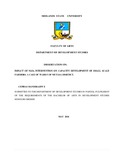Please use this identifier to cite or link to this item:
https://cris.library.msu.ac.zw//handle/11408/2004| Title: | Impact of NGOs intervention on capacity development of small scale farmers: a case of ward 5 of Mutasa district | Authors: | Mandirahwe, Cephas | Keywords: | NGOs operations Capacity development, small scale farmers |
Issue Date: | May-2016 | Publisher: | Midlands State University | Abstract: | NGOs have played a pivotal role towards capacity development of small scale farmers through provision of agricultural information. This study assesses the impact of NGOs intervention on capacity development of small scale farmers in ward 5 of Mutasa district in Manicaland province. The objectives of this study were to assess the capacity needs of farmers, evaluate contribution made by NGOs to enhance capacity of farmers in ward 5 of Mutasa District as well as to assess the challenges faced by NGOs in capacity development of farmers in ward 5 of Mutasa district. The study was located in mixed research paradigm. For qualitative research method key informant interviews, purposive sampling, focused group discussion were used to solicit data from key informants. For quantitative research paradigm cluster sampling techniques and simple random sampling was used to select respondent from small scale farmers. The study revealed that a number of NGOs are involved in capacity development of small scale farmers. These include Plan International, Practical Action, SNV as well as Zim AIED. The study noted that NGOs have contributed significantly towards improvement of livelihoods of farmers in ward 5 of Mutasa District of Manicaland Province of Zimbabwe. Agriculture production increased significantly as well household income as a result of NGOs intervention. Be that as it may, the contribution of NGOs lacked sustainability. This is due to both exogenous and endogenous problems which NGOs were facing. Recommendations were highlighted and key among them include that, small scale farmers should capitalize on practicing banana production as a crop of specialty due favorable climate suitable for banana production. Mutasa Rural District Council should also provide a conducive environment for NGOs operations. | URI: | http://hdl.handle.net/11408/2004 |
| Appears in Collections: | Bachelor Of Arts In Development Studies Honours Degree |
Files in This Item:
| File | Description | Size | Format | |
|---|---|---|---|---|
| MANDIRAHWE CEPHAS.pdf | Full Text | 1.17 MB | Adobe PDF |  View/Open |
Page view(s)
136
checked on Feb 11, 2026
Download(s)
224
checked on Feb 11, 2026
Google ScholarTM
Check
Items in MSUIR are protected by copyright, with all rights reserved, unless otherwise indicated.



